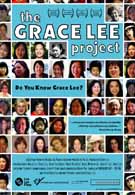The Grace Lee Project is an entertaining documentary that takes the name game to a whole new plateau. Growing up in predominantly white Missouri, Asian-American filmmaker Grace Lee felt distinguished by her nationality and uncommon name. But upon moving to Los Angeles, she received a rude awakening: the name Grace Lee was as common as McDonalds restaurants stationed on every corner.
Experiencing a mid-30s identity crisis, she decides to hunt down these other Grace Lees and learn about their lives. When a private investigator finds too many people with the name and nearly crashes the system trying to compile a full report, Grace launches a website to locate these kindred spirits. Her inbox quickly becomes flooded with thousands of replies. Disappointingly, she discovers that people with the name seem to fit similar, boring molds. The majority appear to be Asian, good students, talented piano players, studious, respectful, and quiet. They are the types who are praised by teachers, liked by all, and then promptly deleted from memory.
Grace Lee finds the homogenous results depressing, and since she doesn't relate to these honorable traits—she was an okay student, avoided steady jobs, stalled on getting married—she tries to find others who shatter the conventional limitations of the name. Among the many subjects she interviews, the most memorable is an 88 year old Chinese social rights activist nicknamed Grace X. She married interracially and devoted years of her life to improving conditions within the African American community. Regardless of her senior citizen status, she is a strong, fascinating woman that can effortlessly command the attention of an auditorium full of people. There is also an angst-ridden 14-year-old, who finds it therapeutic to make voodoo dolls of people she dislikes at school. Let’s hope nobody lends a copy of the movie to the school psychologist.
The most head-scratching Grace Lee in the film is a lesbian activist who started a groundbreaking movement in Korea, opening its first lesbian bar and spending extensive time as an activist in the conservative country. However, three years later, she put a halt on the movement, started living a lie, and decided to shelter her identity out of fear of embarrassing her family. She appears in the film as a big pixilated blob, like something pulled from an episode of "Cops". The shift from an outrageous to mediocre existence upsets the filmmaker, who can’t help but cringe when people follow the unimpressive constraints of the name.
The premise for the film is extremely light, and dragging it out to feature length could have been trying on an audience’s patience. What keeps it interesting is Grace Lee's consistently self-deprecating and funny attitude. Her sarcastic narration and personal insights paint her as a cross between MTV’s Daria and a character from Reality Bites. She is not setting out to make a film to show that people with the same name can be different (since this is painfully obvious), but instead to evaluate people with similar ties and share the purely comical, nonscientific results. There is no preachy message at its core, no gigantic shocks, and no manipulative epiphanies. It is simply an enjoyable movie that laughs in the face of pigeon-holing. Grace Lee may not have the world’s most unique name, but she has created an enjoyable documentary that will not soon be forgotten.











